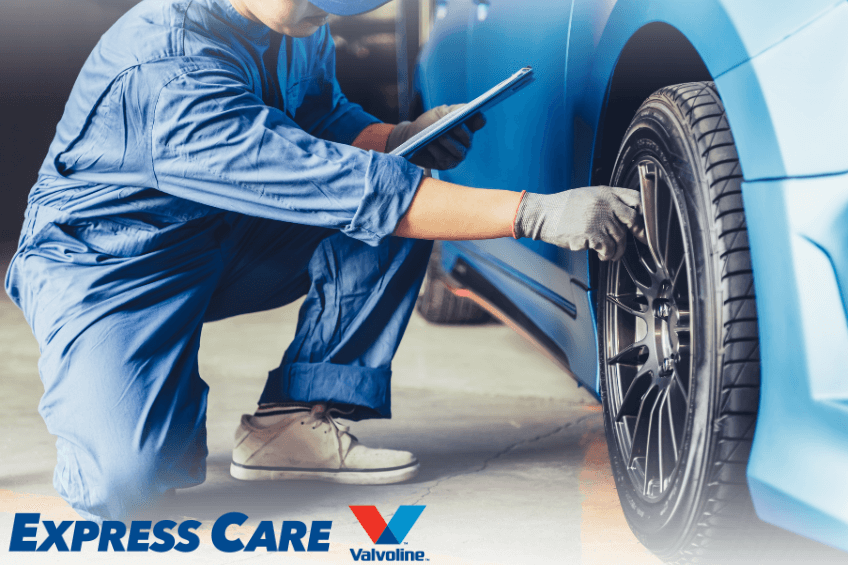

The last time you took your car in for an oil change, you might have been asked if you wanted a tire rotation and balance. While this might have struck you as an add-on mainly to get you to spend more money, it isn’t. Tire rotation as part of your routine car maintenance schedule can extend the life of your tires.
What is a tire rotation? How does it work? Is tire rotation necessary? Because tires are expensive, it’s never good news when a mechanic tells you that you need new tires. However, tire rotation can make your tires last longer, which saves you money as you get more life out of your tires.
If you need a tire rotation or a tire inspection, Valvoline is a one-stop shop for that. Valvoline is a full-service drive-thru operation that looks after the safety and performance of your car and gets you in and out conveniently so you can get back to what you need to do.
Tire rotation involves the removal of the tires and switching them to other locations on the vehicle. The exact pattern of rotation can vary according to the wear patterns, vehicle type, drivetrain type, and manufacturer recommendations.
Tire rotation aims to spread the wear on tires more evenly. Ideally, this results in the tires wearing more or less at the same rate and in the same patterns. That way, when tire replacement is necessary, you get four new tires that wear at the same rate again.
It’s not good to get into a cycle of adding a couple of new tires when the others are moderately worn. This can affect ride and handling and makes tire replacement necessary more frequently than you would prefer. In addition to tires being expensive, installation can chew up several hours of one’s day.
Always check manufacturer specifications when it comes to when and how to rotate tires. Have a pro like Valvoline check it out and do the work for extra peace of mind.
Note that tire rotation does not undo or reverse damage from wear; it only helps ensure more even wear so that tires last longer, hopefully up to their mileage rating.
Friction and heat are the enemies of tires when it comes to tire wear. Friction generates heat, and both wear down tires. Anytime the car is in motion, there is friction and, therefore, heat.
For a drastic but effective example, take someone who peels out in their car, leaving a cloud of burnt-rubber-smelling smoke and dark streaks on the pavement. That smoke and those streaks are worn tire treads caused by extreme friction and heat.
That’s why peeling out, although it might be fun and might impress bystanders, is a bad idea; it can take months off the lifespan of tires in mere seconds. Also, it creates uneven wear since the drive wheels are the ones spinning and burning while the others aren’t.
Hopefully, you’re not peeling out on a regular basis, but that’s an accelerated look at what happens to your tires every day when you drive. When the car’s moving, the tires are wearing, even if ever so gently.
Whether your car is front-wheel drive (FWD) or rear-wheel drive (RWD) also affects wear. If you have FWD, the front tires are doing a lot of pulling, so there is more heat being generated at those tires, resulting in more wear. Likewise, RWD cars see more heat and wear on the rear tires since they’re doing all that pushing.
Will all-wheel drive (AWD) or four-wheel drive (4WD) result in more even wear? Yes, they both will,, but that doesn’t solve everything. There are other factors that affect wear. Plus, AWD and 4WD vehicles tend to be more expensive and get lower gas mileage than comparable counterparts with FWD or RWD, so there’s that to consider.
Another big factor in wear is turning. Since front wheels steer the vehicle, they get wear that the rear wheels don’t, even if your car is RWD. This means that if you have FWD, the front tires will be getting a lot more wear than the rear wheels will.
Other things that affect tire wear include accelerating, breaking, road surface (its heat and composition), and tire pressure, among others. Even scraping a tire against a curb or damaging the rim when hitting a pothole can affect wear.
Even if you haven’t brought your vehicle to Valvoline for a tire rotation, our comprehensive vehicle inspection will help alert you to wear patterns indicating a need for a rotation or new tires.
Simply put, tire rotation spreads the wear more evenly among all four tires, and it helps preserve the tread on them. This keeps you out of the tire shop for as long as possible, but it also brings other benefits.
One of them is safety. If two tires are getting most of the wear while the other two are still looking practically brand-new, you may unknowingly have a couple of tires with tread run so low that they are at risk of blowing while you’re driving.
Another benefit is that tires properly inflated and rotated produce better gas mileage. When you get a tire rotation at a Valvoline location, they’ll also make sure your tires are properly inflated according to manufacturer specs.
A general rule of thumb is to rotate your tires every 5,000-7,500 miles (roughly every other oil change). However, this can vary based on manufacturer recommendations and wear factors such as those we’ve discussed here, so an eyes-on inspection by a Valvoline technician will be sure to get it right.
Whether you have a full-size spare or one of those temporary “donut” spares, you should always make sure it’s properly inflated. If you have to change a tire and the spare is flat, that doesn’t do you any good.
If you have a full-size spare, however, you should incorporate it into your rotation schedule. That way, if you have to put the spare on, you won’t experience issues with ride or handling due to one tire having vastly uneven wear.
Your Valvoline technician should be aware of this but don’t hesitate to ask just to be sure.
Get your car in soon for a tire rotation, oil change, or other services to keep it running well and long!
